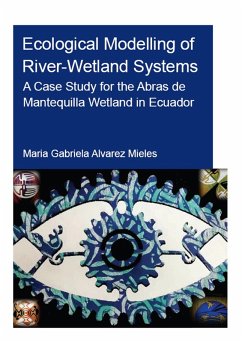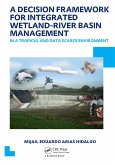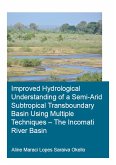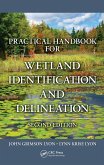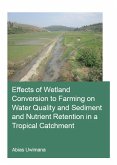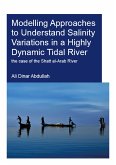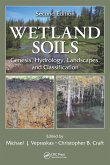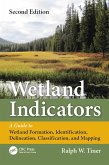Maria Gabriela Alvarez Mieles
Ecological Modelling of River-Wetland Systems (eBook, PDF)
A Case Study for the Abras de Mantequilla Wetland in Ecuador
102,95 €
102,95 €
inkl. MwSt.
Sofort per Download lieferbar

51 °P sammeln
102,95 €
Als Download kaufen

102,95 €
inkl. MwSt.
Sofort per Download lieferbar

51 °P sammeln
Jetzt verschenken
Alle Infos zum eBook verschenken
102,95 €
inkl. MwSt.
Sofort per Download lieferbar
Alle Infos zum eBook verschenken

51 °P sammeln
Maria Gabriela Alvarez Mieles
Ecological Modelling of River-Wetland Systems (eBook, PDF)
A Case Study for the Abras de Mantequilla Wetland in Ecuador
- Format: PDF
- Merkliste
- Auf die Merkliste
- Bewerten Bewerten
- Teilen
- Produkt teilen
- Produkterinnerung
- Produkterinnerung

Bitte loggen Sie sich zunächst in Ihr Kundenkonto ein oder registrieren Sie sich bei
bücher.de, um das eBook-Abo tolino select nutzen zu können.
Hier können Sie sich einloggen
Hier können Sie sich einloggen
Sie sind bereits eingeloggt. Klicken Sie auf 2. tolino select Abo, um fortzufahren.

Bitte loggen Sie sich zunächst in Ihr Kundenkonto ein oder registrieren Sie sich bei bücher.de, um das eBook-Abo tolino select nutzen zu können.
Wetlands are among the most productive environments in the world and therefore of immense socio-economic as well as ecological importance. In this research the focus was on the Abras de Mantequilla wetland in the tropical coastal region of Ecuador, a RAMSAR site and case study in the EU-FP7 WETwin project.
- Geräte: PC
- mit Kopierschutz
- eBook Hilfe
Andere Kunden interessierten sich auch für
![A Decision Framework for Integrated Wetland-River Basin Management in a Tropical and Data Scarce Environment (eBook, PDF) A Decision Framework for Integrated Wetland-River Basin Management in a Tropical and Data Scarce Environment (eBook, PDF)]() Mijail Eduardo Arias HidalgoA Decision Framework for Integrated Wetland-River Basin Management in a Tropical and Data Scarce Environment (eBook, PDF)86,95 €
Mijail Eduardo Arias HidalgoA Decision Framework for Integrated Wetland-River Basin Management in a Tropical and Data Scarce Environment (eBook, PDF)86,95 €![Improved Hydrological Understanding of a Semi-Arid Subtropical Transboundary Basin Using Multiple Techniques - The Incomati River Basin (eBook, PDF) Improved Hydrological Understanding of a Semi-Arid Subtropical Transboundary Basin Using Multiple Techniques - The Incomati River Basin (eBook, PDF)]() Saraiva OkelloImproved Hydrological Understanding of a Semi-Arid Subtropical Transboundary Basin Using Multiple Techniques - The Incomati River Basin (eBook, PDF)95,95 €
Saraiva OkelloImproved Hydrological Understanding of a Semi-Arid Subtropical Transboundary Basin Using Multiple Techniques - The Incomati River Basin (eBook, PDF)95,95 €![Practical Handbook for Wetland Identification and Delineation (eBook, PDF) Practical Handbook for Wetland Identification and Delineation (eBook, PDF)]() John G. LyonPractical Handbook for Wetland Identification and Delineation (eBook, PDF)168,95 €
John G. LyonPractical Handbook for Wetland Identification and Delineation (eBook, PDF)168,95 €![Effects of Wetland Conversion to Farming on Water Quality and Sediment and Nutrient Retention in a Tropical Catchment (eBook, PDF) Effects of Wetland Conversion to Farming on Water Quality and Sediment and Nutrient Retention in a Tropical Catchment (eBook, PDF)]() Abias UwimanaEffects of Wetland Conversion to Farming on Water Quality and Sediment and Nutrient Retention in a Tropical Catchment (eBook, PDF)58,95 €
Abias UwimanaEffects of Wetland Conversion to Farming on Water Quality and Sediment and Nutrient Retention in a Tropical Catchment (eBook, PDF)58,95 €![Modelling Approaches to Understand Salinity Variations in a Highly Dynamic Tidal River (eBook, PDF) Modelling Approaches to Understand Salinity Variations in a Highly Dynamic Tidal River (eBook, PDF)]() Ali Dinar AbdullahModelling Approaches to Understand Salinity Variations in a Highly Dynamic Tidal River (eBook, PDF)57,95 €
Ali Dinar AbdullahModelling Approaches to Understand Salinity Variations in a Highly Dynamic Tidal River (eBook, PDF)57,95 €![Wetland Soils (eBook, PDF) Wetland Soils (eBook, PDF)]() Wetland Soils (eBook, PDF)198,95 €
Wetland Soils (eBook, PDF)198,95 €![Wetland Indicators (eBook, PDF) Wetland Indicators (eBook, PDF)]() Ralph W. TinerWetland Indicators (eBook, PDF)173,95 €
Ralph W. TinerWetland Indicators (eBook, PDF)173,95 €-
-
-
Wetlands are among the most productive environments in the world and therefore of immense socio-economic as well as ecological importance. In this research the focus was on the Abras de Mantequilla wetland in the tropical coastal region of Ecuador, a RAMSAR site and case study in the EU-FP7 WETwin project.
Dieser Download kann aus rechtlichen Gründen nur mit Rechnungsadresse in A, B, BG, CY, CZ, D, DK, EW, E, FIN, F, GR, HR, H, IRL, I, LT, L, LR, M, NL, PL, P, R, S, SLO, SK ausgeliefert werden.
Produktdetails
- Produktdetails
- Verlag: Taylor & Francis eBooks
- Seitenzahl: 352
- Erscheinungstermin: 14. Mai 2019
- Englisch
- ISBN-13: 9781000517781
- Artikelnr.: 56840389
- Verlag: Taylor & Francis eBooks
- Seitenzahl: 352
- Erscheinungstermin: 14. Mai 2019
- Englisch
- ISBN-13: 9781000517781
- Artikelnr.: 56840389
- Herstellerkennzeichnung Die Herstellerinformationen sind derzeit nicht verfügbar.
Maria Gabriela Alvarez Mieles was born in Guayaquil, Ecuador. She has a Bachelor degree in Biology from the Natural Sciences Faculty at Universidad de Guayaquil, with honours 'Accesit al Contenta' equivalent to magna cum laude. During her early career, she has worked at the Aquatic Pollution department of a National Research Institute in Ecuador (Instituto Nacional de Pesca - INP), participating in monitoring campaigns in some of the main rivers, sea, and estuaries in protected areas. Later she joined Efficacitas, an environmental consultancy office where she participated in several environmental impact assessments, audits and monitoring campaigns for different productive sectors of Ecuador (water, electric, hydrocarbons, mining and industry).
She pursued the MSc in Environmental Sciences at UNESCO-IHE, specialization Planning and Management, with a fellowship from the World Bank (2007). Her MSc thesis was about "Ecological Indicators-A tool for assessment the present state of a river. A pre-impoundment study in Quevedo-River, Ecuador". IN 2007, she received an internship at DELTARES, in the Marine and Coastal Department for one of the R&D projects on 'Building with Nature'. In 2008, she was engaged at UNESCO-IHE, first contributing to the EU funded research project based on Lake Maryut (Egypt). In 2009, she had the opportunity to join the WETwin project (EU funded), as a researcher for the Ecuadorian case study (on a wetland in the Guayas River Basin). The project focus aimed to enhance the role of wetlands in integrated water resource management. Her involvement in this project motivated her to pursue a PhD in order to enhance the research for the Abras de Mantequilla wetland.
She developed her PhD research at UNESCO-IHE, Department of Water Sciences & Engineering, with a fellowship from the Dutch Ministry of Foreign affairs (Netherland fellowship programme NFP-NUFFIC), and financial support from the WETwin project for her fieldwork campaigns. Her PhD thesis was on environmental monitoring and modelling of the 'Abras de Mantequilla' wetland (RAMSAR site 2000) in Ecuador, applying analytical metrics and ecological modelling to enhance the understanding of tropical wetland systems.
She pursued the MSc in Environmental Sciences at UNESCO-IHE, specialization Planning and Management, with a fellowship from the World Bank (2007). Her MSc thesis was about "Ecological Indicators-A tool for assessment the present state of a river. A pre-impoundment study in Quevedo-River, Ecuador". IN 2007, she received an internship at DELTARES, in the Marine and Coastal Department for one of the R&D projects on 'Building with Nature'. In 2008, she was engaged at UNESCO-IHE, first contributing to the EU funded research project based on Lake Maryut (Egypt). In 2009, she had the opportunity to join the WETwin project (EU funded), as a researcher for the Ecuadorian case study (on a wetland in the Guayas River Basin). The project focus aimed to enhance the role of wetlands in integrated water resource management. Her involvement in this project motivated her to pursue a PhD in order to enhance the research for the Abras de Mantequilla wetland.
She developed her PhD research at UNESCO-IHE, Department of Water Sciences & Engineering, with a fellowship from the Dutch Ministry of Foreign affairs (Netherland fellowship programme NFP-NUFFIC), and financial support from the WETwin project for her fieldwork campaigns. Her PhD thesis was on environmental monitoring and modelling of the 'Abras de Mantequilla' wetland (RAMSAR site 2000) in Ecuador, applying analytical metrics and ecological modelling to enhance the understanding of tropical wetland systems.
